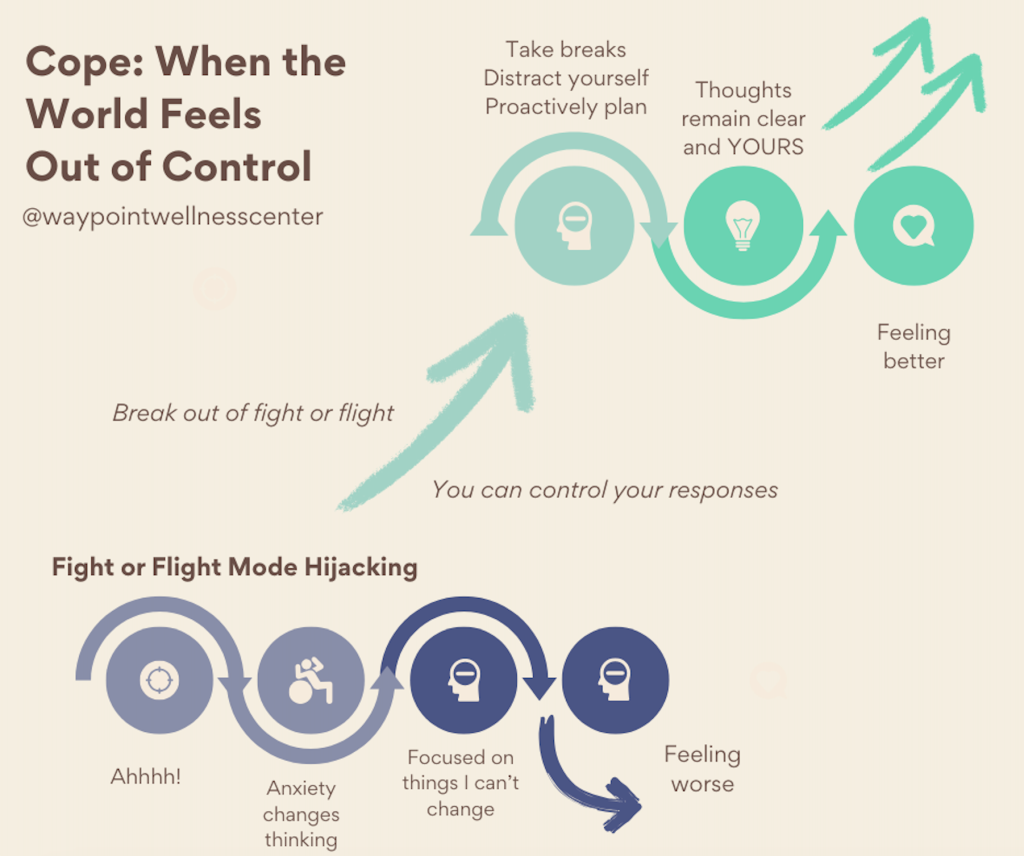By Erin Castleberry, MS, LCPC
The world feels a topsy turvy to many people right now. Precedent and social norms are being challenged around the world leaving many people feeling unsettled or even scared. Some of the major touchstones in life are being threatened: safety, relationships, jobs, financial stability, and even core beliefs. When a threat feels existential, our fight-or-flight response kicks in. Of course it does, that’s literally it’s job.
But here is the important thing to know about anxiety: When you’re anxious, you are by design not using the executive function part of your brain which is the exact part you need during times of great distress. So, what can you do to lift the blockade that’s keeping that emotional trigger locked in your fight-or-flight region and making you feel desperate? How can you move that information along to your frontal lobe so you can effectively problem solve?
Control the things you can
What CAN you control?
- Your thoughts
- Your feelings
- Your behaviors
What is OUT of your control?
- Other’s thoughts
- Other’s feelings
- Other’s behaviors
It’s important to recognize WHERE your power lies in any situation. Often, when we’re worried or feel under attack we just want to ‘make it stop’ and that isn’t always possible. We can’t always reason with others whose behaviors are hurting us and, sometimes, there isn’t even a specific person to direct our concern. Of course, you should try to shield yourself from threat if you can. Sometimes that will be successful. But, when we find ourselves unable to change the situation, then we have to change course.
Be proactive
Anxiety is triggered by uncertainty and rooted in a belief that you can’t handle whatever catastrophic outcome you envision is ahead of you. However, if you’re taking proactive steps toward building your resilience and expanding your options, you will inevitably feel a reduction in anxiety because you won’t feel helpless. When you’re in the grip of anxiety, staying focused on what you CAN do will keep you operating in the problem-solving region of your brain. It won’t remove the trigger, but it will reduce your physical and emotional distress and keep you thinking clearly.
Imagine trying to build a house on a battlefield where you’re under attack. You will continue to be drawn away from your task in order to save yourself. This is what happens when you identify with victimhood or helplessness. Your fight-or-flight response prioritizes immediate self-preservation over comprehensive problem-solving.
As you consider your pro-active options, you have to be very clear on the actual threats. Fact check things with others you trust so you can identify options to mitigate their realistic impact on you. Label the facts plainly, without exaggeration and without emotion. Then think in terms of a decision tree: “IF this happens, THEN I will do this next. IF this does not happen, THEN I will proceed in this alternative way.” You might want to even draw it out if you’re a visual person.
If you feel yourself getting overwhelmed because it seems like you have no options, remember you always have an option. If you can’t change the situation, you can change how you feel about the situation by releasing your grip on the outcome you’re pushing for. By expanding your mind to envision a broader range of acceptable outcomes, you will open up more options and start to feel empowered again. Once you equip yourself with a plan, you can face the rocky road ahead with appropriate nourishment and supplies.
Take a break
Sometimes, we need distraction. In perilous times, we might feel the pull to stay informed so we lock into the 24-hour news cycle. However, that really messes with our hormones and emotional regulation. Social media apps and news outlets make money by keeping our attention so they also often recycle news stories hourly as “Breaking News” when they’ve actually been saying the same thing for the last 12 hours.
Instead of doom-scrolling, designate a time to bring yourself up to speed, consume content from a few different outlets to be sure you’re getting a broad picture of the story, and respect the time limit you’ve set for this. Then, turn it off! Step away from your phone or your TV. This is the only way your cortisol and adrenaline (the stress hormones that wreak havoc on your nervous system) will have a chance to return to normal. Find something soothing to do during this time: bake, go for a walk, color, knit, pet your dog, play an instrument, take a bath.

In a nutshell…
Remember that anxiety is actually a useful emotion. It helps us pay attention to things that threaten us. If you harness its power, you can see clearly what you need to do and also trust yourself to know when it’s okay to set the weight of things aside in order to recharge yourself. If this process seems daunting, a therapist can help you process your emotions and develop a plan. Be well or be in touch. We’ll be rooting for you either way. You’ve got this!




